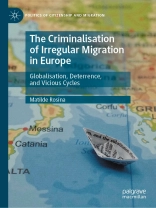This book explores the criminalisation of irregular migration in Europe. In particular, it investigates the meaning, purpose, and consequences of criminalising unauthorised entry and stay. From a theoretical perspective, the book adds to the debate on the persistence of irregular migration, despite governments’ attempts at deterring it, by taking an interdisciplinary approach that draws from international political economy and criminology. Using Italy and France as case studies, and relying on previously unreleased data and interviews, it argues that criminalisation has no effect on migratory flows, and that this is due to factors including the latter’s structural determinants and the likely creation of substitution effects. Furthermore, criminalisation is found to lead to adverse consequences, including by contributing to vicious cycles of irregularity and insecurity.
Cuprins
Chapter 1. Introduction.- Chapter 2. Globalisation and irregular migration.- Chapter 3. Deterrence in international migration: Between IPE and criminology.- Chapter 4. Criminalising migration in Europe.- Chapter 5. Italy: From tough rhetoric to counter-productive consequences.- Chapter 6. France: Between instrumentalization, courts, and marginalisation.- Chapter 7. The effects and counter-effects of criminalisation: On skinny balloons and vicious cycles.- Chapter 8. Conclusion.
Despre autor
Matilde Rosina is Fellow in International Migration at the European Institute of the London School of Economics and Political Science, UK. Her research focuses on irregular migration, with specific reference to the European context. Matilde obtained her award-winning Ph D in International Political Economy from King’s College London, having received scholarships from the Luigi Einaudi Foundation and the Jean Monnet Foundation for Europe. Before joining LSE, Matilde lectured at City, University of London, and at Fordham University.












